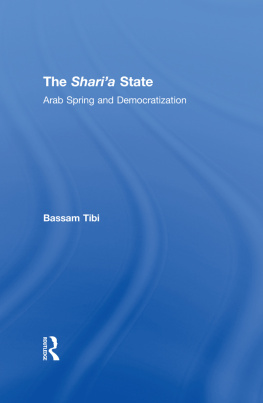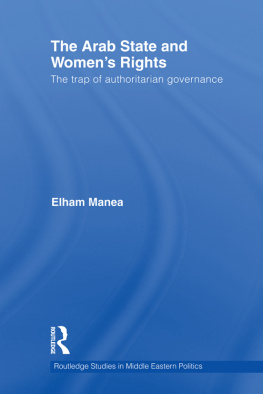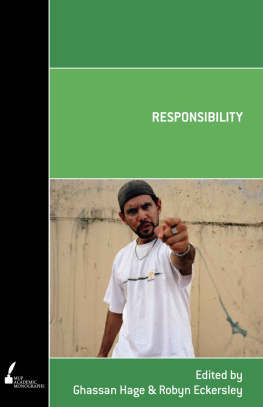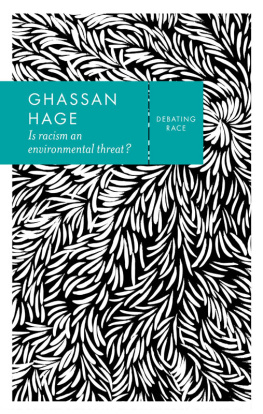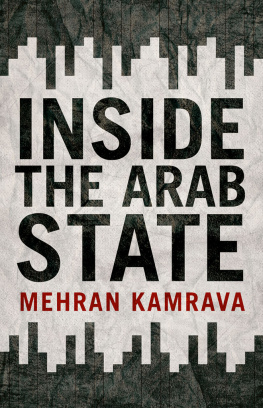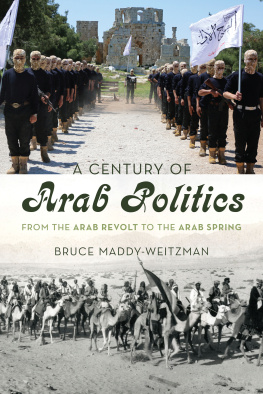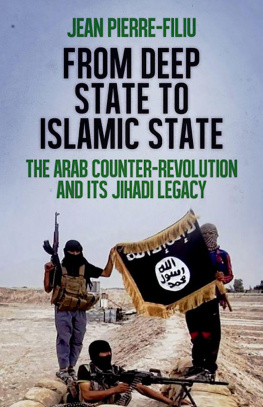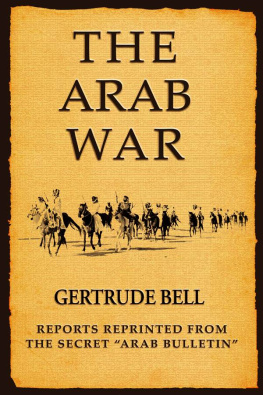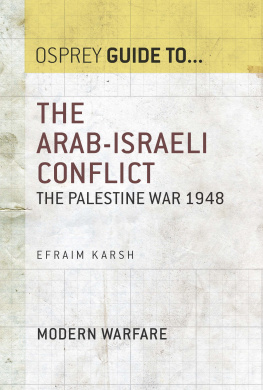First published 1987 by Routledge
Reprinted 2002
By Routledge, 2 Park Square, Milton Park, Abingdon, Oxon, OX14 4RN
Transferred to Digital Printing 2006
Routledge is an imprint of the Taylor & Francis Group
1987 Istituto Affari Internazionali
British Library Cataloguing in Publication Data
The Foundations of the Arab State.
(Nation, state and integration in the
Arab world; v. 1)
1. State. The 2. Arab countries
Politics and government 1945-
I. Salam, Ghassan II. Series
320.109174927 JQ1850.A2
ISBN 0-7099-4143-9
Library of Congress Cataloging-in-Publication Data
ISBN 0-7099-4143-9
Typeset in Times Roman by Leaper & Gard Ltd, Bristol, England
Publisher's Note
The publisher has gone to great lengths to ensure the quality ofthis reprint but points out that sorne irnperfections in the original rnay be apparent
The Arab State is a series of four collective volumes exploring the origins, foundations, impact and stability of Arab states. This volume is the first in the series; it is devoted to an analysis of the historical and cultural foundations of the state in the Arab region and a discussion of their peculiarity. It is indeed often stated that Arab states are different because of their specific historical origins or because of constraints imposed by Islam or by Arab culture, and that they suffer from the tension of an ill-defined national identity. The purpose of this volume is to offer a fresh look at the question and to propose alternative opinions as to the importance of this difference.
The series is the result of a collective research effort organised by the Istituto Affari Intemazionali over a period of three years, under the general title of State, Nation, Integration in the Arab World. This undertaking was made possible by a generous main grant from the Ford Foundation, and an equally generous additional grant from the International Development Research Centre (IDRC) of Canada. The latter was specifically devoted to supporting the work of Arab scholars writing on economic issues. Further financial support was received from the Italian Ministry of Foreign Affairs, and from the Commission for Cultural Exchanges between Italy and the United States.
The Istituto Affari Intemazionali worked in co-operation with the Panteios School of Political Science in Athens, which was responsible for the organisation of two international gatherings, allowing authors of different chapters to come together and discuss their ideas in depth. As a result, while these are collective volumes, we believe that they have reached a degree of homogeneity which is not normally found in these undertakings. The Panteios School also supported one of the meetings with its own funds, decisively contributing to the success of the project.
Help was also received from the Gustav E. von Grunebaum Centre for Near Eastern Studies at the University of California, Los Angeles, which entertained me in February and March 1984 and again in the Autumn of 1986.
The project was directed by an international steering committee in which the following participated:
Roberto Aliboni, Director, Istituto Affari Internazionali
Hazem Beblawi, Chairman, Egyptian Export Development Bank
Ursula Braun, Consultant, Stiftung Wissenschaft und Politik
Marwan Buheiry, Professor, American University of Beirut
Alexander Cudsi, Professor, Panteios School of Political Science
Adeed Dawisha, Professor, George Mason University
Omaymah Dahhan, Professor, University of Jordan
Georges Sabagh, Director, the Gustav E. von Grunebaum Center for Near Eastern Studies, UCLA
Ghassan Salam, Professor, American University of Beirut
I. William Zartman, Director, Africa Program, School for Advanced International Studies, Johns Hopkins University
The committee played a major role, and I as director of the project am very substantially indebted to its members for their advice in planning the research effort and selecting contributors. Some of the members also served as editors for a volume, thus exercising closer responsibility on the material included in it: this first volume was edited by Ghassan Salam.
I received substantial help and advice also from other friends. Ali-Eddine Hilal Dessouki was expected to be on the committee, but a variety of circumstances prevented him from participating in its deliberations. I did, nevertheless, greatly benefit from his generous advice and detailed comments, during numerous interviews in Cairo. My debt to him is indeed substantial. I also greatly benefited from the friendly advice that I received from Judy Barsalou of the Ford Foundation in Cairo, Ann Lesch of the American Field Staff in Cairo, Andrew Watson of the IDRC in Cairo, and Gary Sick of the Ford Foundation in New York.
My personal thanks are also due to the staff of the Istituto Affari Internazionali who contributed with sympathy and dedication to the complex organisation of this undertaking.
The shape of this project was deeply influenced by the advice of two friends who unfortunately did not live to see its conclusion. The steering committee decided to dedicate the four volumes to their memory.
I had met Malcolm Kerr in Los Angeles when the project was still in its planning stage, and he gave me valuable advice at that time. I asked him to be a member of the committee, but he was then expecting to be appointed President of the American University of Beirut. He insisted, however, that he wanted to be associated with the project, so much so that the first meeting of the steering committee was hosted by him at Marquand House in June 1983. He participated in our deliberations then, and contributed to the formation of the basic decisions which shaped the project. His assassination was a tragedy for us personally and professionally, and has marked a disastrous turning point in West Beirut's struggle to remain one of the intellectual centres of the world.
The same negative turn of events finally drove Marwan Buheiry out of Beirut. Marwan was, personally and intellectually, a living example of West Beirut's intellectual curiosity and non-sectarian spirit. He participated intensely in the work of the steering committee and in the meetings connected with this project, until death struck unexpectedly, in exile.
It has been an honour and an educational experience for me to serve as the director of this project, and I wish to thank all contributors for the very many things I have learned. I hope that the reader will find these volumes as instructive as preparing them was for me. Any shortcoming, as usual, should be ascribed to my responsibility only.



